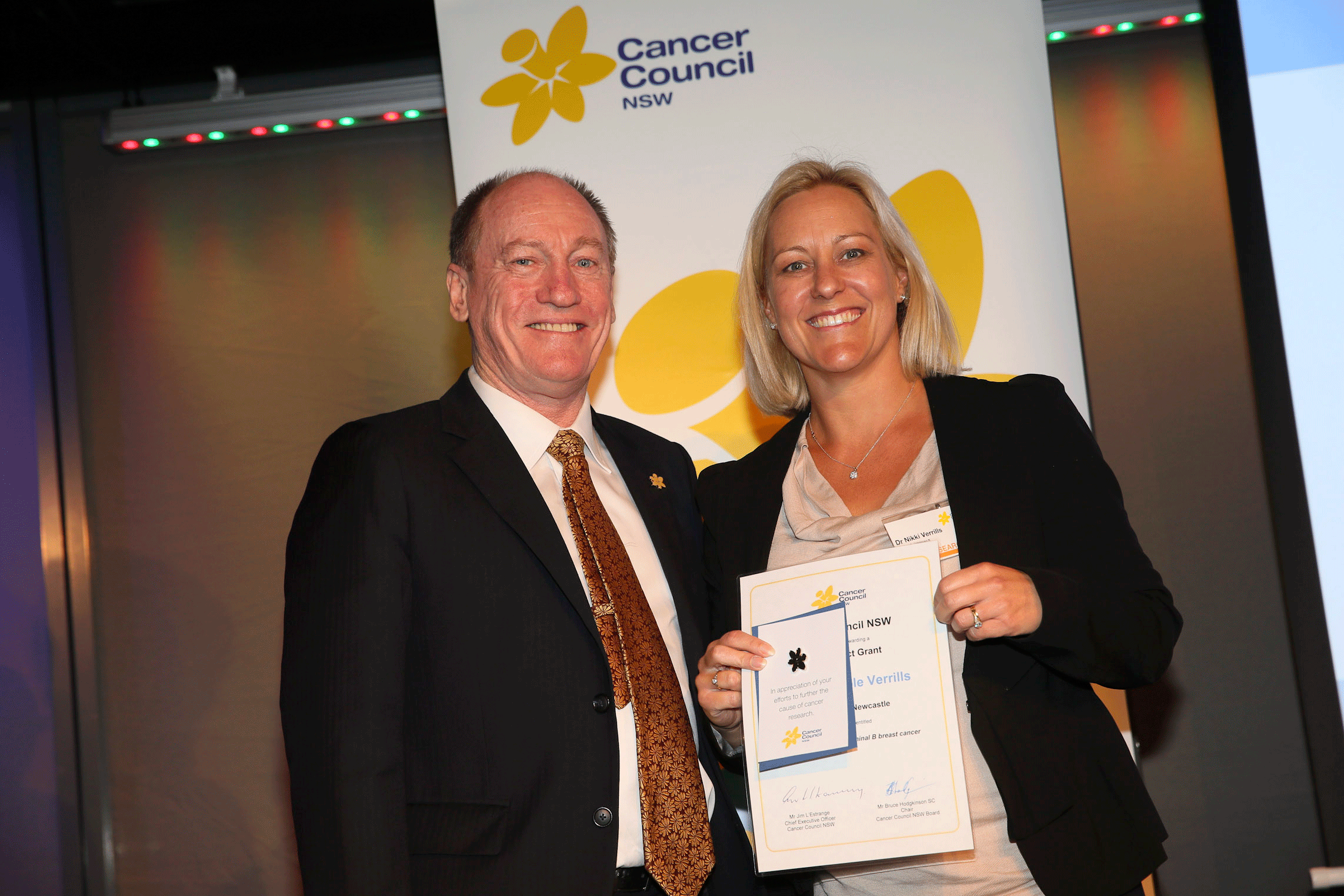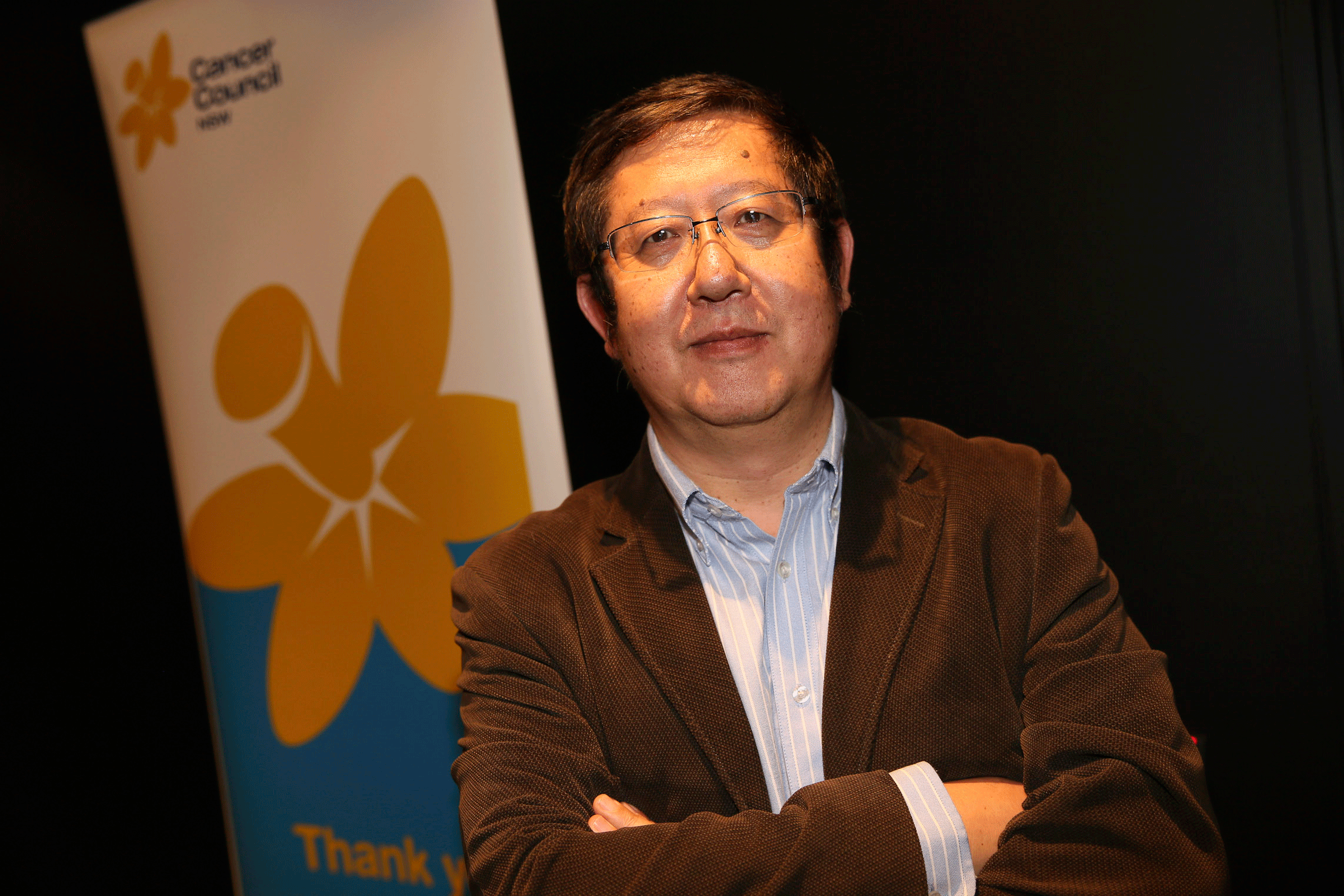$1m for visionary cancer researchers
Two of the University of Newcastle's leading researchers have been awarded more than $1m in grants to focus on discovering new methods of curbing and treating cancer.
 Cancer Council NSW, the largest non-government cancer research funder in NSW, has awarded funding to support Professor Xu Dong Zhang and Dr Nikki Verrills.
Cancer Council NSW, the largest non-government cancer research funder in NSW, has awarded funding to support Professor Xu Dong Zhang and Dr Nikki Verrills.
The funding will support their visionary research that will help challenge what is known about cancer and how it is treated - contributing to the Cancer Council's goal of reducing deaths from cancer by 50 per cent over the next 20 years.
The three research projects from the University of Newcastle include:
- Identifying new avenues for the treatment of bowel cancer by targeting a specific protein led by Professor Xu Dong Zhang
- Investigating if a particular protein helps melanoma cells survive leading to new treatments, also led by Professor Xu Dong Zhang
- Predicting which breast cancers will respond to a new kind of treatment, possibly leading directly to human trials, led by Dr Nicole Verrills.

Regional Manager for Cancer Council' Newcastle region Shayne Connell said it was very exciting to see two University of Newcastle researchers being awarded funding for their work.
"We look forward to seeing the results from these projects in the future," he said.
"This year we received 143 outstanding applications for grants, which shows the drive in the medical research community to learn more about cancer and the ways we treat cancer, which is a very complex disease.
"Dr Verrills and her team are working on testing a new gene marker that can predict which breast cancer patients won't survive, and so should be offered new therapies. This study could lead directly to human trials which could help thousands of women who are affected by breast cancer in Australia each year," Mr Connell said.
Dr Verrills said she and her team appreciated the funding which would enable them to specifically focus on patients who do not respond well to current therapies.
"While we have seen significant improvements in breast cancer treatments over the past decade, breast cancer still kills far too many women, with almost 3,000 Australian women losing their lives to this disease every year.
"This project aims to develop a predictive test to determine who will or will not respond to standard therapy.
"Importantly, we will also perform pre-clinical studies to test a new therapeutic approach for these non-responsive breast cancers.
By concentrating on those patients who we know would not otherwise survive, we are addressing a major clinical need, and ultimately hope that this new strategy of personalised therapy will result in more patients surviving this disease."
Professor Xu Dong Zhang said he and his team were very grateful for the continued support from the Cancer Council and the community.
"The funding will go towards the team's persistent efforts at getting closer to beating cancer," he said.
Mr Connell said Cancer Council NSW was very fortunate to be working with the best cancer researchers who are based right on their doorstep in Newcastle
"These new and novel research projects wouldn't be possible if it wasn't for the generous donations of the local Newcastle and Hunter communities to Cancer Council."
Professor Zhang is a Co-Director of the Priority Research Centre (PRC) for Cancer of the University of Newcastle's Faulty of Health, and a Deputy Director of the Cancer Program of Hunter Medical Research Institute (HMRI).
Dr Verrills researches in association with the University of Newcastle's Priority Research Centre for Cancer, Priority Research Centre for Chemical Biology and Hunter Medical Research Institute – Cancer.
HMRI is a partnership between the University of Newcastle, Hunter New England Health and the community.
For more information on Cancer Council NSW research visit www.cancercouncil.com.au
The UON projects:
A novel biomarker for luminal B breast cancer
Chief Investigator: Dr Nikki Verrills, University of Newcastle
Almost 3,000 Australians die of breast cancer each year. This project will test if a new 'gene marker' can predict which patients won't survive, and so should be offered new therapies. Importantly, Dr Verrills has discovered that breast cancer cells with this gene marker are sensitive to a drug that is already in clinical use for other cancers. Therefore if successful, the study could lead directly to human trials, with the ultimate goal of curing those patients for whom currently no cure exists.
RIP1 as a novel therapeutic target in melanoma
Chief Investigator: Professor Xu Dong Zhang, University of Newcastle
Despite the recent advances in targeted therapy and immunotherapy, curative treatment of metastatic melanoma remains an unmet health problem. In this project, Professor Zhang will potentially demonstrate that a protein called RIP1 is abnormally expressed at high levels in melanoma cells and plays an important role in melanoma cell survival and resistance to treatment, and thus identify inhibition of RIP1, either alone or in combination with other drugs, as a novel approach in the treatment of melanoma. This research is funded with the support of the Estate of the Late Clement Saxton.
Elevated INPP4B as a biomarker and therapeutic target in colorectal cancer
Chief Investigator Professor Xu Dong Zhang, University of Newcastle
Although early-detected bowel cancer is potentially curable, fewer than 40% of bowel cancers are noticed at early stages. Patients with late-stage bowel cancer are often treated with drugs, but most patients will eventually die of the disease due to drug resistance. In this project, Professor Zhang will identify inhibition of INPP4B that is increased in bowel cancer cells, either alone or in combination with other drugs, as a novel approach in the treatment of bowel cancer, thus improving treatment benefit. This research is funded with the support of the Estate of the Late Valerie Enid Legge.
Contact
- Media and Public Relations.
- Phone: 02 4921 5577.
Related news
The University of Newcastle acknowledges the traditional custodians of the lands within our footprint areas: Awabakal, Darkinjung, Biripai, Worimi, Wonnarua, and Eora Nations. We also pay respect to the wisdom of our Elders past and present.